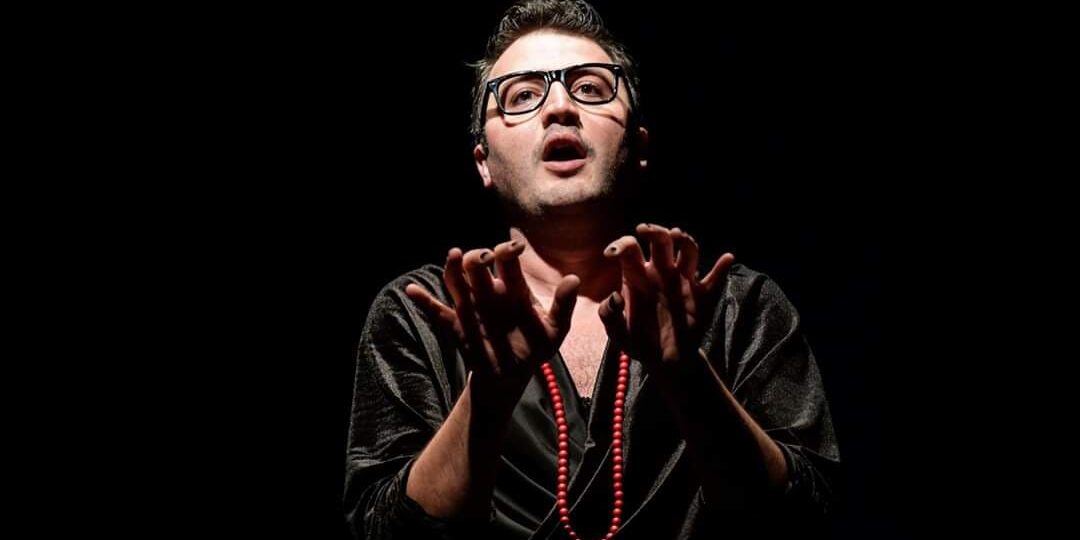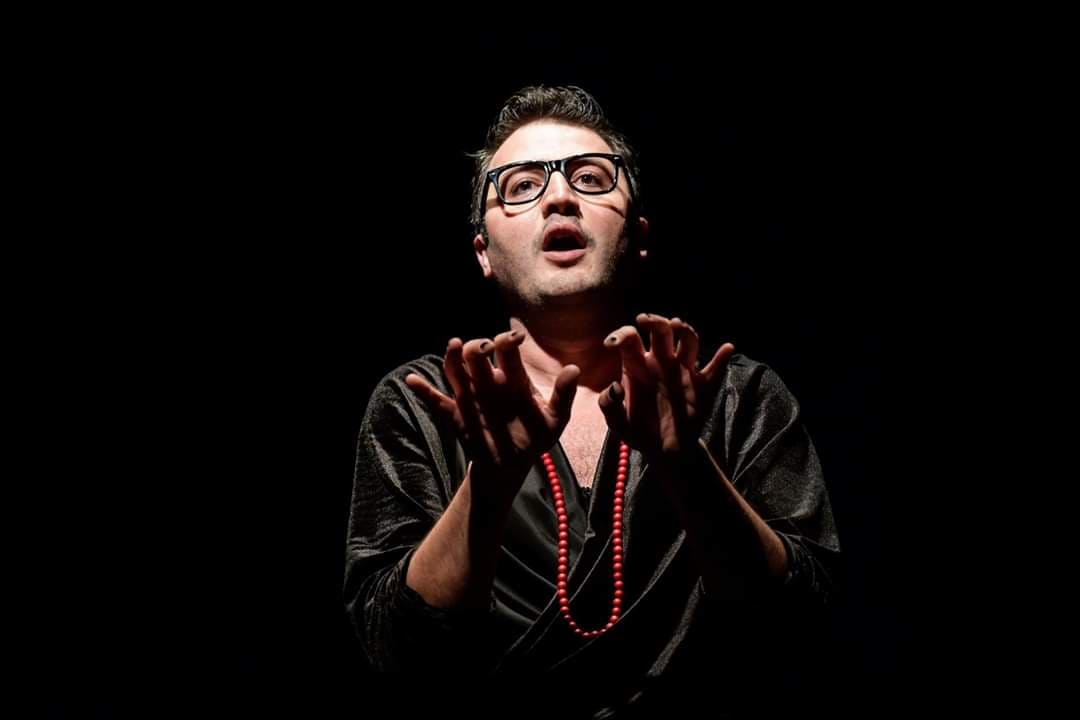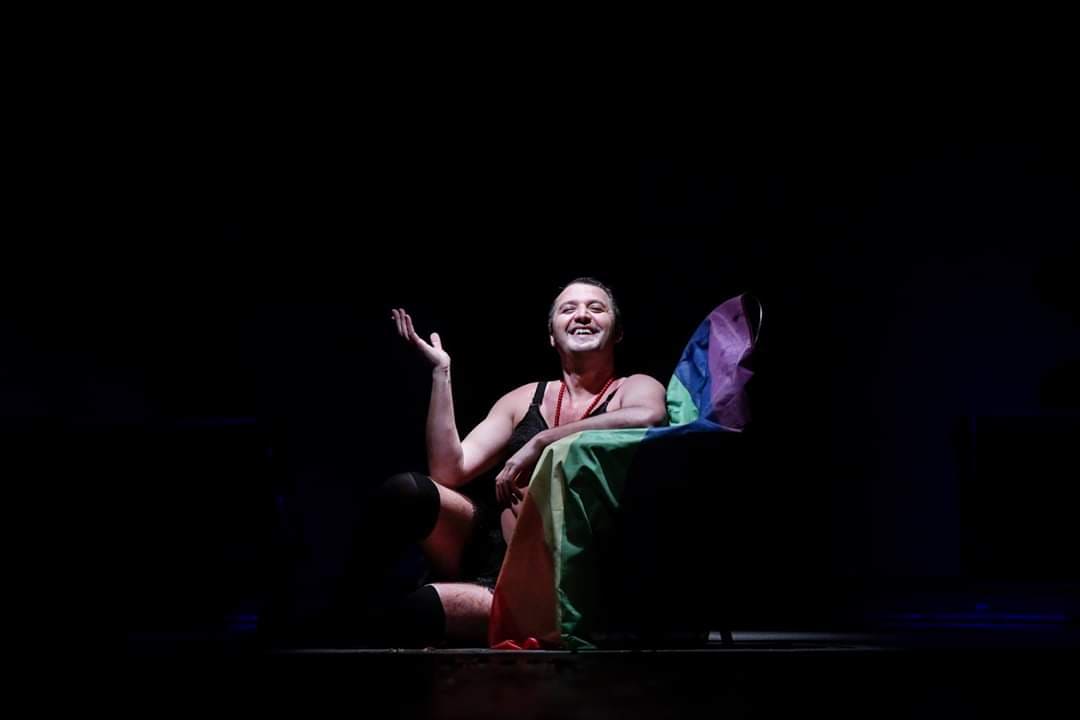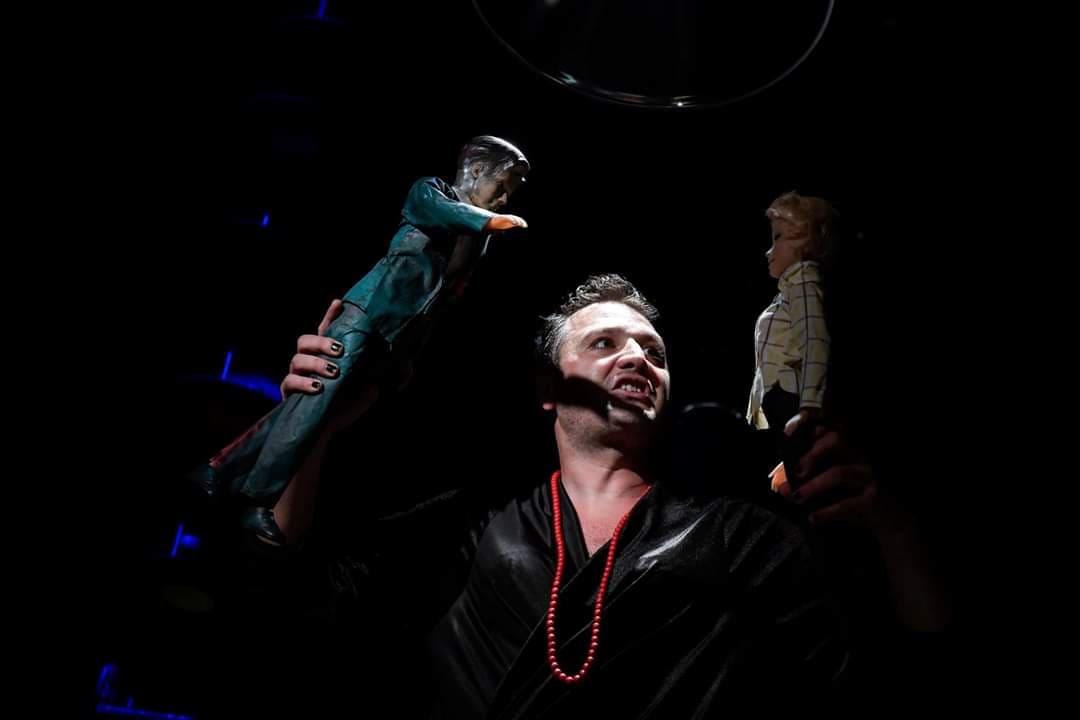Adrian Morina is a virtuosic actor and part of the ensemble at Kosovo’s national theatre, Teatri Kombëtar, where until recently he was its acting artistic director. I first met Morina in November 2020 when I witnessed his extraordinary solo performance in an adaptation of I am my Own Wife (by Doug White) which was based on the life of transgender woman Charlotte von Mahlsdorf and performed in Qendra Multimedia’s Theatre Showcase in Pristina. The play seemed to announce a new way of working for Morina. Here I catch up with him to talk all things acting and for an update on the country’s theatre scene a year later into the pandemic. I began by asking him why he went into theatre.
Actually it was because of a film! When I was 5 or 6 I saw my first movie in an open air cinema in Prizren, Kosovo and after that I said to myself “I am going to become an actor!” But my parents wanted me to go to medical school and then they wanted me to go onto the Faculty of Medicine. I did what they asked, but I secretly applied to the Faculty of Arts to study acting at the same time. Of course, I was accepted and the great Yugoslavian actor Faruk Begolli became my teacher, which had been my dream all along. And that was when I understood the magic of theatre. Theatre has helped me to be more open to people, to listen to them and to what they have to say and to understand what they need. I still believe theatre can change the world – it has changed me for sure.
Has it changed how you think about Kosovo as well?
I started my study immediately after the Kosovo war and there was a lot of energy being put into trying to build a new society. But people needed money to build homes that had been destroyed by the fighting and they didn’t have financial support from the government or NGOs, so this energy didn’t last long and there was no interest in culture, except from the younger generation. But we did start to think about theatre differently. The first show after the war in Teatri Kombëtar was Hamlet by the British director David Gothard. It was 3 hours and 40s minutes and we couldn’t believe that Hamlet and Shakespeare could be so Albanian. So then we tried to create new shows where the people are our stories. Now we try and make work which shows a different side to Kosovo.
How would you say that theatre has changed aesthetically in this time since independence?
During the 90s the shows were very classical and theatre was treated as if it were a science, where things could only be said through metaphor. But after the war we felt we could speak freely to people and because we wanted to communicate about societal problems to our audiences we started to do this engaged and political theatre. Some theatre is still classical, but the now the younger generations question why should we do this text? Why this author, what are we trying to say, what are we trying to tell people?
And change came when we started inviting directors from other countries. For example we had the Albanian director, Altin Basha, from Kadare, who directed a stage version of the Palace of Dreams. He studied in England and was able to pass on his knowledge to us.
Have you met any resistance to these kinds of changes?
Well, even directors who work in different ways or critics or older teachers (older in how they think, not in years) would say this kind of politically engaged theatre is not theatre, it is performance. They still talk about the difference between a show (by which they mean a classical play) and everything else, which they call a performance. But not always. In 2019 we were adapting a classical play, The Living Sphinx, by the academic Rexhep Qosja and whilst we kept the play’s structure, we made it contemporary by talking directly about the political killings that took place in Kosovo after the war. Two hundred Albanians were killed and the murderers are still at large. Of course we were afraid of the political reaction and afraid of what the author would say too, because we only kept seven pages of his original text. But after the show he congratulated us, and he was quoted in the national newspaper saying that he was amazed at our production and at our power and artistry and courage to speak freely about issues in Kosovo.
How have you changed as a theatre artist? You embraced the monologue form in I am own Wife, which previously you had been reluctant to do.
To be honest when I read the play for the first time I didn’t think about it becoming a monologue. But when I started to learn more about Charlotte von Mahlsdorf and her life in Germany during WW2 and what it was like for her under the Stasi-Nazi regime and when the Berlin Wall fell, it reminded me a lot of my own life in Kosovo before and after the war when we were trying to build a new state. And when I started to analyse the text and I saw how people were suffering and how people from the LGBTQIA community in Kosovo are still are suffering, I realised it was necessary to do the show and play all the characters so I could directly address the people and talk about all the issues in it.
Can you talk a little bit about the new play you’re in, Swiss Connection by Jeton Neziraj, at Theater Winkelwiese in Zurich?
It’s a new experience for me and for the audience because we are speaking in Albanian and in German. So in order to really understand the play and each other we had to rehearse some scenes in English first and then come back to the German and Albanian. It’s about a group of people who laid the groundwork for the Kosovo war during the 80s and 90s in Switzerland. I play a guy called “Schnellfuse” (it means a person who walks very fast), who raises funds to help with the liberation of Kosovo. And all this had happened in “Neutral Swiss” territory, so it’s a crime comedy thriller with great actors. The director is great, he has a Monty Pythonesque style and though the play is very political, it is also very comical. It has to be otherwise it would be too serious and it wouldn’t work.
How are things in Kosovo a year on from when we last spoke in November 2020?
When we spoke then the government had promised 5 million euros for the theatre sector to help with the pandemic. Nothing came of that. Now finally they have had an open call for this money, but it is not 5 million any more, it is much less, and it is open to all the artistic fields, not just theatre. A lot of people have applied, but it might not mean much. For example, earlier, Qendra Multimedia applied for funding for a co-production with La MaMa theatre in New York and they got 5,000 Euros! Qendra refused to take it, because it will only cover a few airplane tickets to the US. The politicians really need to understand how artists are struggling and what things cost. For example, our filmmakers are making very low budget films which are winning prizes all over Europe and at Sundance and so on and the politicians still say, “Kosovo is the best for culture and we are going to invest in it” and yet still do nothing. I really hope that this will change with the new politicians we have now, but it is very hard to say. But I really hope Kosovo can become more supportive and open minded towards artists.
So what is happening to freelance actors, how are they coping?
There was a list of 80 artists who applied for help from the government and they got around a 1,000 Euros each for the whole period of the pandemic. Imagine.
At one point we did have about half a million from Culture for Change from the European Union. It helped because they gave the money to independent artists, but now that fund has been discontinued. Even the Europeans think we don’t need culture in Kosovo. Let’s hope this new call will fund the real artists.
How will this fund work then?
About 800 projects or artists are applying for it and because the government doesn’t want to be seen to be favouring one project more than another, each project will get 2,000 Euros. For comparison, Winkelwiese Theater has an annual budget of around a million from Zurich Kanton (a state in Switzerland). Then they can apply for other funding. The Teatri Kombëtar has 300,000 Euro for the year. And the city theatres in Kosovo have around 50,000. And the government go, “This is the money. We are a poor country, take it or leave it.”
Is there something the public can do to show the government it needs to support theatre more?
It’s the artistic community which needs to fight to get the government’s attention, not the public. We’re a small community and we have no voting power, so we have to be more radical and build networks with other art sectors. We did this two years ago when actors at Teatri Kombëtar united with other government supported arts groups like the National Opera to demand proper wages. This is the model that the community needs to follow.
Do you think this ‘make do” culture in the arts comes from before independence?
Yes, but we have a culture now where artists are getting too close to politicians. The politicians give them a financial handout every now and then to shut them up.
So what preoccupies you most as an artist now?
I had an interesting experience with a friend of mine who was an actor/politician. In 2014 there was an open call for the director of Teatri Kombëtar and the main political party put forward their press officer, someone with no artistic experience at all. I thought, OK I will apply for it, because I didn’t think that politicians should be getting involved with the arts. My friend, who was a member of the same party as this press officer, said that he would never vote for him. But then he did just that. This year my friend finally admitted he was forced into voting the way he did and he now realises that politics and art can’t mix. I wish this kind of behaviour would stop, but I actually think that artists more and more are trying to get closer to politicians as a way to survive.
When you look at your professional life as an actor and a theatre maker so far, how would you sum it up?
A friend once told me, “Be careful what you dream.” I was born in 1981 and right up until now, everything I remember in my life has been about protests, demonstrations, the war and the continual (and current) tensions between Serbia and Kosovo around identity and sovereignty. This mess is all I remember and know. Because of this I have built an alternative world for myself in theatre and I feel totally realised. But, I do wonder, are my dreams ambitious enough? And yet I have been so lucky. I have been in 50 plays. I have worked and tried hard. It’s my life. That’s why I am here, it’s why I live.
Verity Healey is a writer and critic published by The Stage, Open Democracy, Howlround, British Council, Calvert Journal, with editorial commissions for Belarus Free Theatre. She is a contributing author to Routledge Companion to Contemporary European Theatre and Performance (pub 2022).











